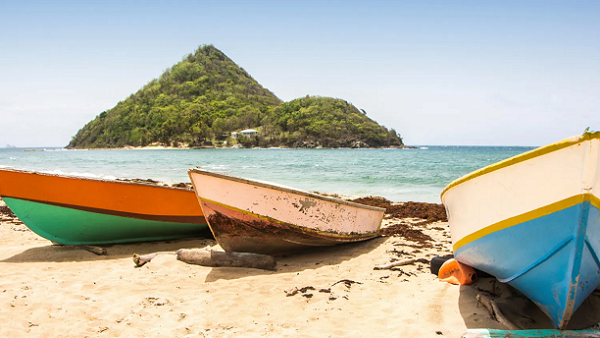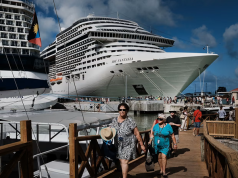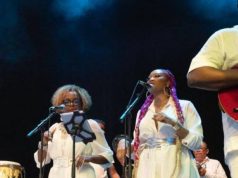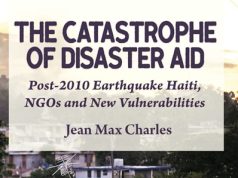

Kira Richards (The Sunday Times, 20 September 2025) describes a trip that honors her brother’s memory. “Kira Richards has family heritage in Grenada in the Caribbean, but after losing her sibling found it too traumatic to go back. Ten years later, how will she find it?” [Many thanks to Peter Jordens for bringing this item to our attention.]
Horns and whistles sliced through the jovial sound of soca music. I was wedged between hundreds of people jostling around me, most of them slathered in vibrant paint and thick black grease that dripped like molasses, sweating under the stifling August sun. I was only 12 and in the epicentre of my first Grenadian carnival, known as J’Ouvert. But I wasn’t alone among the overwhelming masses flooding the streets of Sauteurs, the island’s northernmost town. My older brother, Ethan, was by my side, immersed in the festivities, a Grenadian flag tied around his head as he bobbed along to the blaring beats.
Today I am walking down the same road that we paraded along more than ten years prior, and vignettes of that two-week family holiday are flashing into my mind. The street is still lined with multicoloured painted shops and houses, again lively soca is playing from a makeshift restaurant in a white gazebo at the side of the street, where a chalkboard sign tells me there’s barbecue chicken, rice and macaroni pie on the menu.
Memories of a special family holiday
In 2014, just over a year after that first Caribbean adventure to Grenada, Ethan died from an aggressive brain tumour at the age of 15. He was my only sibling, two years older than me, and his death engulfed my adolescence with grief, both for him and for the loss of the opportunity to discover more of our British-Caribbean background together. Since Ethan’s death, I’d not returned to the island. I had worried that new memories would overwrite the decade-old fuzzier ones, isolating him further from my life today. But while I’ll never forget him I’d now spent almost half my life without him. I felt ready to return, to reconnect with him and our heritage. [. . .]
Rediscovering Grenada’s rural north
[. . .] My first stop is the Belmont Estate, a 17th-century former plantation in the northeast, whose 300 acres of land have been repurposed as a heritage centre and an organic farm complete with a goat dairy, and producing cocoa, spices and vegetables to be used in its canopy-level restaurant. Before it cultivated the produce found onsite today, it was one of 81 plantations on the island which used the labour of enslaved Africans to grow coffee and sugarcane until 1834, when slavery was abolished in Grenada. [. . .]
I plan this latest journey to cover the same ground. Most travellers stay in the south of the island, exploring the spice markets of the capital, St George’s, which brim with aromatic nutmeg, cinnamon and bay leaves; lazing on the longest beach on the island, Grand Anse, a two-mile stretch of white sugar sand and sapphire sea; and diving into the country’s history at the Molinere Underwater Sculpture Park, a first-of-its-kind collection of 75 sculptures symbolising unity and resilience. But for me it’s the rural north that appeals, for its verdant heartlands rich with biodiversity and memories of my previous time there. [. . .]
Ethan loved chocolate and he’d often exaggerate his reaction to taking a bite, savouring it slowly before bursting into a toothy grin, as if it were the best thing he’d ever eaten. As much as he would have enjoyed learning about its production on the estate, I suspect his favourite part of the process would have been sampling the goods at the end.
Chocolate and rum is a classic Caribbean pairing, so it feels apt to visit the River Antoine Estate Rum Distillery next, only a seven-minute drive from the Belmont Estate. Though I’ve not been to the distillery before, its signature white rum, Rivers, was my grandfather’s favourite. His always fully stocked drinks cabinet in London was never without it. Call it a home comfort. [. . .]
Before winding back down the coast, where I go on to explore the Grand Étang National Park and Concord Falls — I make a final stop at Levera beach, where hundreds of endangered leatherback turtles lay eggs every April to June. The shoreline sparkles. Waves swell. I inhale the salty air and close my eyes. Ethan’s death made me furious at the world. It was impossible to accept the unadulterated joy of being in our ancestral home being followed by inconceivable tragedy. Initially, returning to Grenada had felt akin to reuniting with an old friend; familiar yet distant. But while much of its landscape has been developed, its heart is the same. I stand on the beach, knowing Ethan is here with me, even if it is only my footprints in the sand. I know he’d be overjoyed I returned to the island that bridged our British childhood to our Caribbean heritage. [. . .]
For more information, see https://www.thetimes.com/travel/destinations/caribbean-travel/grenada/grenada-calabash-gfpt6ch65
Kira Richards (The Sunday Times, 20 September 2025) describes a trip that honors her brother’s memory. “Kira Richards has family heritage in Grenada in the Caribbean, but after losing her sibling found it too traumatic to go back. Ten years later, how will she find it?” [Many thanks to Peter Jordens for bringing this item




